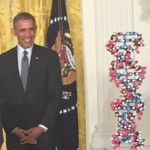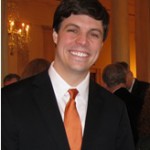By Lori Andrews

President Obama at the launch of the Initiative
Last Friday, I was a guest at the White House for President Obama’s launch of the Precision Medicine Initiative. The goal of the Initiative is to sequence people’s genomes and read the nuances of their genes to determine how to prevent disease or more precisely treat it. The President illustrated how this would work by introducing Bill Elder, a 27 year old with cystic fibrosis. Bill has a rare mutation in his cystic fibrosis gene and a drug was fast-tracked at the FDA to target that mutation. “And one night in 2012, Bill tried it for the first time,” explained President Obama. “Just a few hours later he woke up, knowing something was different, and finally he realized what it was: He had never been able to breathe out of his nose before. Think about that.”
When Bill was born, continued the President, “27 was the median age of survival for a cystic fibrosis patient. Today, Bill is in his third year of medical school.” Bill expects to live to see his grandchildren.
The Precision Medicine Initiative will involve sequencing the genomes of a million Americans. Such a project would have been unimaginable if we hadn’t won the Supreme Court case challenging gene patents. Prior to that victory, genetic sequencing cost up to $2,000 per gene due to patent royalties. Now it will cost less than ten cents per gene.
The people who volunteer as research subjects for the project may expect cures for their own diseases. But, even when genetic mutations are discovered, cures are a long way off. “Medical breakthroughs take time, and this area of precision medicine will be no different,” said President Obama. And despite the fanfare surrounding genetics, researchers often find that environmental factors play a huge role in illness. At the same time the White House was preparing for the launch of the Precision Medicine Initiative, Stanford researchers and their colleagues across the globe were publishing a study in the January 15 issue of the prestigious journal Cell challenging the value of sequencing research. Their study, “Variation in the Human Immune System is Largely Driven by Non-Heritable Influences,” tested sets of twins’ immune system markers. The result: Nearly 60% of the immune system differences were based on the environment rather than genes.
Capturing environmental information about the million volunteers will involve invasions of their privacy as their health and behavior is categorized and quantified from every perspective. Their genetic data will be combined with medical record data, environmental and lifestyle data, and personal device and sensor data. If not handled properly, this data could be used to stigmatize the research participants or discriminate against them. Will they be properly informed of the risks in advance? Will sufficient protections be in place for their device and sensor data, which is often not covered by medical privacy laws such as HIPAA?
At the White House last Friday, President Obama said, “We’re going to make sure that protecting patient privacy is built into our efforts from day one. It’s not going to be an afterthought.” He promised that patient rights advocates “will help us design this initiative from the ground up, making sure that we harness new technologies and opportunities in a responsible way.”

Professor Andrews with Henrietta Lacks’ descendants at the White House
President Obama underscored that commitment by inviting members of Henrietta Lacks’ family to last Friday’s event. In 1951, Henrietta Lacks was dying of cervical cancer. A researcher at Johns Hopkins University undertook research on her cells without her knowledge or consent (or that of her family). Her immortalized human cell lines provided the basis for generations of research in the biological sciences, as well as research by commercial companies. When her husband learned about it years later, he said, “As far as them selling my wife’s cells without my knowledge and making a profit—I don’t like it at all.”
A former Constitutional Law professor, President Obama is aware of the importance of people’s rights. Let’s hope that his aspiration of an Initiative that guards research subjects’ autonomy and privacy will be honored by the scientists who will actually operationalize the $215 million project.

